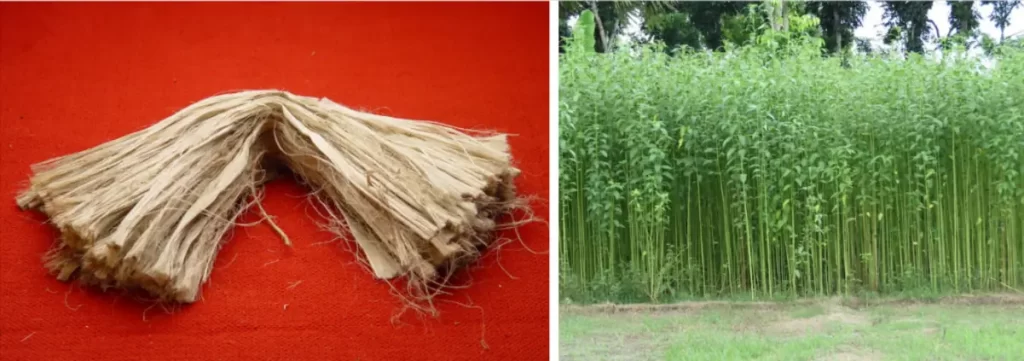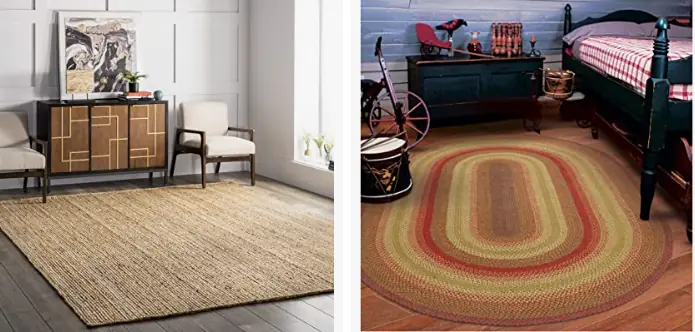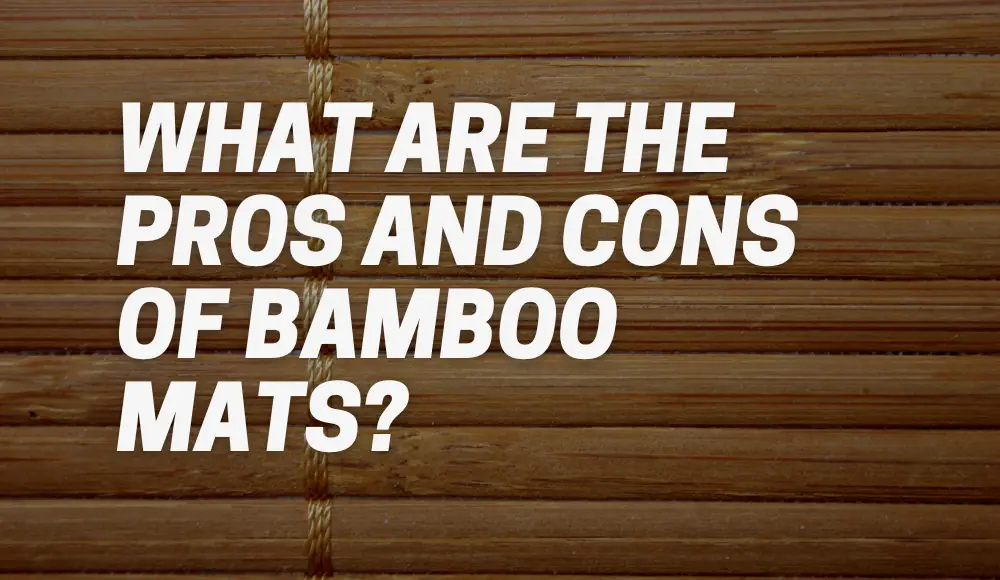Last updated on November 2nd, 2023 at 01:27 am
When it comes to decorating our homes, we often strive for a perfect blend of style and comfort. Jute rugs have become increasingly popular in interior design due to their natural and earthy appeal. However, before investing in a jute rug, it’s essential to consider certain factors, one of which is their smell. In this article, we’ll delve into the fascinating world of jute rugs and explore whether they have a smell, why they might smell bad, and how to address any potential odor issues.
So, let’s get started!
What Does Natural Jute Smell Like?
Jute, a natural fiber derived from the jute plant, possesses a distinctive smell that is often described as earthy and grassy.

When you unroll a new jute rug, you may notice a subtle, organic scent. This scent is a result of the natural oils and fibers present in jute.
While some individuals find this smell pleasant and reminiscent of the outdoors, others may perceive it as a bit strong or unfamiliar.
Does Jute Have a Strong Smell?
The strength of the smell associated with jute can vary from rug to rug.
Factors such as the manufacturing process, storage conditions, and the age of the jute rug can all influence the intensity of the smell. Generally, the smell of jute is not overpowering, and it tends to dissipate over time with proper care and ventilation.
Why Does Jute Smell Bad?
In some cases, jute rugs may emit a less pleasant odor that can be described as “bad.”
In these cases people are concerned about the specific smell of jute, for instance: Why does jute smell like kerosene? or do Jute rugs smell like sulfur?
This smell is usually a result of poor storage conditions or the presence of moisture during transportation. When jute fibers are exposed to excessive humidity or moisture, they can develop a mildew-like odor, which is certainly not desirable in your home.
Do Jute Rugs Smell Like Mold?
Does jute smell musty? This is another widespread concern.
As already mentioned, jute rugs, especially when exposed to damp conditions, can indeed develop a smell reminiscent of mold.
Why new jute rug smells like mildew
Mold thrives in moist environments, and if a jute rug is stored or transported in a humid or damp location, it may absorb moisture and become a breeding ground for mold spores.
It’s crucial to address this issue promptly to prevent any potential health risks associated with mold exposure.
Why Does a New Jute Rug Smell Like Mildew After Cleaning?
If you’ve recently cleaned your jute rug and noticed a lingering mildew-like smell, it could be due to insufficient drying or improper cleaning methods.
Jute fibers are highly absorbent, and if excess moisture is present during the cleaning process, it can lead to mold or mildew growth.
To avoid this issue, ensure your jute rug is thoroughly dried after cleaning, ideally in a well-ventilated area with ample airflow.
Do Jute Rugs Off Gas?
Off-gassing refers to the release of volatile organic compounds (VOCs) into the air by certain materials, including rugs and carpets.
However, jute rugs are generally considered to have low levels of off-gassing compared to synthetic alternatives.
Jute is a natural and sustainable material, making it a preferred choice for eco-conscious individuals.
Nonetheless, if you have a sensitivity to odors or chemicals, it’s recommended to allow your new jute rug to air out in a well-ventilated area before placing it in your living space.
Does Jute Smell Go Away?
Fortunately, the smell associated with jute rugs is not permanent. With time, proper care, and a few helpful tricks, you can significantly reduce or eliminate the odor entirely.
Here are some steps you can take to expedite the process:
How do you get the smell out of jute carpet
- Air It Out: Unroll your new jute rug in a well-ventilated space, such as a patio or open window, and allow it to breathe for a few days. Fresh air circulation will help dissipate the smell more quickly.
- Use Baking Soda: Sprinkling baking soda over your jute rug and leaving it overnight can help absorb and neutralize odors. Vacuum the rug the next day to remove the baking soda residue.
- Essential Oils: Adding a few drops of your favorite essential oil to a spray bottle filled with water and misting your jute rug can impart a pleasant scent while masking any remaining odor.
- Sunlight Exposure: Jute rugs benefit from exposure to sunlight. If possible, place your rug in a sunny spot for a few hours, as sunlight has natural deodorizing properties.
By following these steps, you can accelerate the process of eliminating the initial smell of your jute rug and enjoy its natural beauty and texture without any unwanted odors.
How Do You Make Jute Not Smell?
To make your jute rug odor-free, it’s crucial to establish a routine for cleaning and maintenance.
In addition to already mentioned steps on how do you make a jute rug not smell here are a few more tips to help you keep your jute rug smelling fresh:
How do you get the smell out of a jute rug
- Regular Vacuuming: Vacuum your jute rug at least once a week to remove any dirt, dust, or debris that may contribute to an unpleasant smell.
- Spot Cleaning: Address spills or stains promptly by blotting them with a clean, damp cloth. Avoid rubbing or scrubbing, as it can spread the stain and potentially damage the jute fibers.
- Proper Drying: After cleaning your jute rug, ensure it is completely dry before placing it back on the floor. Dampness can lead to mildew growth and an unpleasant odor.
- Avoid Excessive Moisture: Prevent water damage by keeping your jute rug away from areas prone to spills, such as kitchens and bathrooms. If you live in a particularly humid climate, consider using a dehumidifier to maintain optimal indoor humidity levels.
- Rotation and Sunning: Periodically rotate your jute rug to ensure even wear and sun exposure. Sunning your rug on a dry day can help eliminate any residual odors and keep it fresh.
- Use Deodorizer for Natural Rugs: In our contemporary, you can find everything you need on the market for any situation. So the deodorizer for rugs and carpets. If you like to add specific scents you your interior elements, such as rugs, find the best deodorizer for yourself. Or you can make homemade deodorizer.
Deodorizer for natural carpets as jute rug cleaner
Homemade deodorizer for jute rugs
—
With these simple yet effective practices, you can maintain the freshness of your jute rug and enjoy its natural beauty for years to come.
Professional cleaning options
If none of these DIY methods work, you can consider having your jute rug professionally cleaned by an experienced cleaner who knows how best to handle natural fiber rugs like jute ones.
Professional cleaners have access to specialized cleaning solutions that effectively break down dirt and stains while also removing any unpleasant smells trapped in the fibers.
By following these simple yet effective tips on how to reduce or eliminate jute rug smell, you can enjoy all the benefits of this eco-friendly material without worrying about any lingering unwanted odors.
Other Considerations When Purchasing Jute Rugs
Quality and Durability Factors
When purchasing a jute rug, it’s important to consider the quality and durability of the rug.
High-quality jute rugs are tightly woven with evenly spaced fibers that are uniform in thickness. Good quality jute rugs should also come with a backing material to prevent slipping.
It’s also important to check for any fraying or unraveling of the edges which can be an indication of poor craftsmanship.
Durability is also another consideration when purchasing a jute rug, as it should be able to withstand regular use without showing signs of wear and tear.
Environmental Impact of Jute Production
Jute is considered an environmentally friendly material because it is biodegradable, renewable, and sustainable.
Jute plant fibers grow quickly and require fewer pesticides and fertilizers than other crops which makes jute production eco-friendly compared to synthetic materials like polyester or nylon.
However, there are still some environmental concerns such as water usage during processing, waste disposal during the manufacturing process as well as transportation costs associated with shipping from countries where jute is grown.
Alternative Rug Materials
While jute rugs are an excellent option for many homeowners looking for natural fiber options, there are alternative materials that may suit your needs better depending on your preferences.
Some alternative natural fibers include sisal, seagrass, and hemp which offer comparable characteristics like durability and eco-friendliness but may have different textures or colors available than jute rugs.
Synthetic materials such as polyester or nylon may provide more color options but do not offer the same level of sustainability that natural fibers do.
When considering purchasing a new rug there are a few things to consider beyond just whether or not it smells – quality factors like tight weaving and consistent thickness can make all the difference in how long it will last, the environmental impact of jute production is something that many consumers are increasingly concerned about, and alternative materials may offer different textures and color options.
Whatever your preference, it’s important to research your options before making a purchase.
Conclusion
Jute rugs can indeed have a smell, but it’s typically a mild and natural scent that dissipates over time.
The presence of a strong or unpleasant odor may be an indication of storage or cleaning issues that need to be addressed.
By understanding the factors that contribute to the smell of jute rugs and implementing proper care and maintenance techniques, you can ensure a pleasant and odor-free experience with your jute rug.
So go ahead and embrace the beauty of jute rugs in your home, knowing that their enchanting texture and earthy charm will outweigh any temporary scent concerns.




